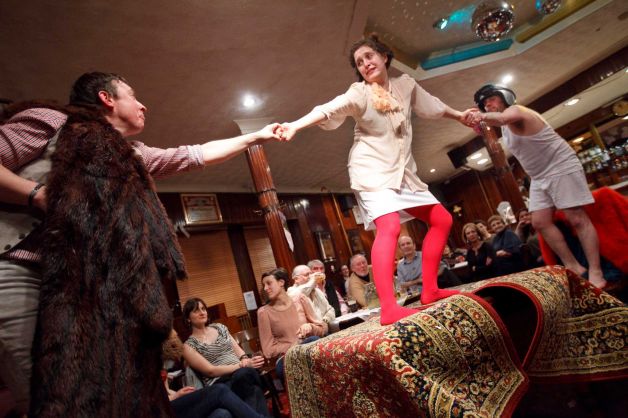Preview of The Strange Undoing of Prudencia Hart, Arts & Ideas Festival
Annie Grace, of the National Theatre of Scotland, has performed in The Strange Undoing of Prudencia Hart more than 400 times, all over the place. The troupe and their signature play are back in New Haven this weekend to kick off the 21st annual Arts & Ideas Festival and to give New Haveners a newer taste of a play that first played here on its first world tour back in 2012.
There are two new cast members this time, filling the essential roles of Prudencia (now played by Jessica Hardwick) and her rival Colin Syme (now played by Paul McCole), and then there’s the supporting cast of three (Grace, Paul MacKay and music director Alasdair Macrae) who play a whirlwind variety of supporting roles and many authentic instruments—Grace plays Scottish Border pipes, whistles, ukulele and the bodhran (a drum), and sings. Her “musical husband” Macrae plays fiddle and guitar and they’ve been collaborators on many projects and performances.
There’s another member of the cast as well: the audience.
As conceived and written by David Grieg, with the original members of the cast and director Wils Wilson, the show is designed to take place in a pub and it’s meant to involve the audience in sundry ways. “The audience is in close contact to the spectacle and becomes part of the show, that’s essential,” says Grace. Last time, Prudencia played in June in the backroom of the Wicked Wolf. This time, it’s found a more suitable locale at Gryphon’s Pub, the hang-out of Yale grad students tucked away off York Street (officially it’s The Graduate and Professional Student Club—or GPSCY—at Yale). Prudencia’s tale of sparring and romancing academics at a winter conference in Kelso in the Scottish Borders region should feel right at home.
The music and story, Grace says, were inspired by border ballads, such as Tam Lin, a tale of metamorphosis at the hands of a fairie queen. There’s also a run-in with the devil and much enchantment, as well as a ribald romp of a bacchanal. As Grace says, Prudencia is a straight-laced, buttoned-up sort, who is “actually a wee bit naughty but doesn’t realize it.” Stuck in a blizzard in the Scottish Borders, she comes to learn that “hell is a bed-and-breakfast in Kelso.”
Paul McCole, Jessica Hardwick, Annie Grace, Paul MacKay, Alasdair Macrae
Grace says Prudencia is a play “that keeps on giving,” an extended work “dear to our hearts because we helped create it.” Initially, Greig showed up with six pages of script and the basic idea. He had been working in site-specific theater for children and was eager to do the same thing for adults. And where do adults become most like children? Why, at a pub of course. The show has gone up in small halls and theaters as well but Grace says it’s not the same ambiance. In fact, a key comic scene takes place in a pub in the play—or a pub within a pub—where the cast gets to do knock-offs of the kind of folk scene one finds in Kelso. This time the tour will end in Kelso itself. One can only imagine the devilry the locals will get up to for that event—since the scenes set in the pub there were inspired by actual local performers that Greig encountered on his “fact-finding” visit to the town. So, instead of the kinds of ancient ballads Prudencia is keen to encounter, you get a laughable bollocks of “Blowin’ in the Wind.”
No matter how many times they play their roles, Grace says, the troupe members are “always finding new things. David Greig is really a genius and the play is so very clever.” Most of the script is in verse and, Grace says, it sometimes takes a while for the audience to realize it. The devil, however, speaks prose and the scenes of satanic encounter strike a different note from the rest. There are also jokes about academia and popular culture and the once cutting-edge combination called “cultural studies.” “Colin is keen to bring folk studies into the twenty-first century,” Grace says, and Prudencia is less than amused by his fast and loose approach to their mutual discipline. Which makes for a lot of fun at the expense of both. Some of the references are starting to date a bit, Grace concedes, “iPods aren’t a new thing any more and are starting to be a bit passé.” Still, it’s not as if we didn’t all live through the early 21st century.
In looking for locales for the show, Grace says, the troupe needs a big room with good sight lines. “The play was conceived as a storytelling show—like 30 people sitting around a fire.” So it’s best with an audience of 120 max and tables and maybe a bit of drinking. In explaining the show and its setting, Grace refers to an old tradition: what it means “to have a song. Like a party piece, the thing you sing” that becomes your trademark, so to speak. Prudencia, she says, “has to find her song.”
And what better place to find a song—that’s also a tall tale, a quest for personal fulfillment, a journey of discovery, a research expedition, a romance, an enchantment, and a deal with the devil—than in the Scottish Borders, in the snow? Or in New Haven, in a pub.
The Strange Undoing of Prudencia Hart plays tonight, April 1, at 8 p.m., Saturday, April 2, at 3 & 8 p.m., and Sunday, April 3, at 3 p.m.
International Festival of Arts & Ideas presents:
The Strange Undoing of Prudencia Hart
From the National Theatre of Scotland
Created by David Greig and Wils Wilson
Festival 2016
March 30-April 3, 2016
The Gryphon's Pub
204 York Street
New Haven



